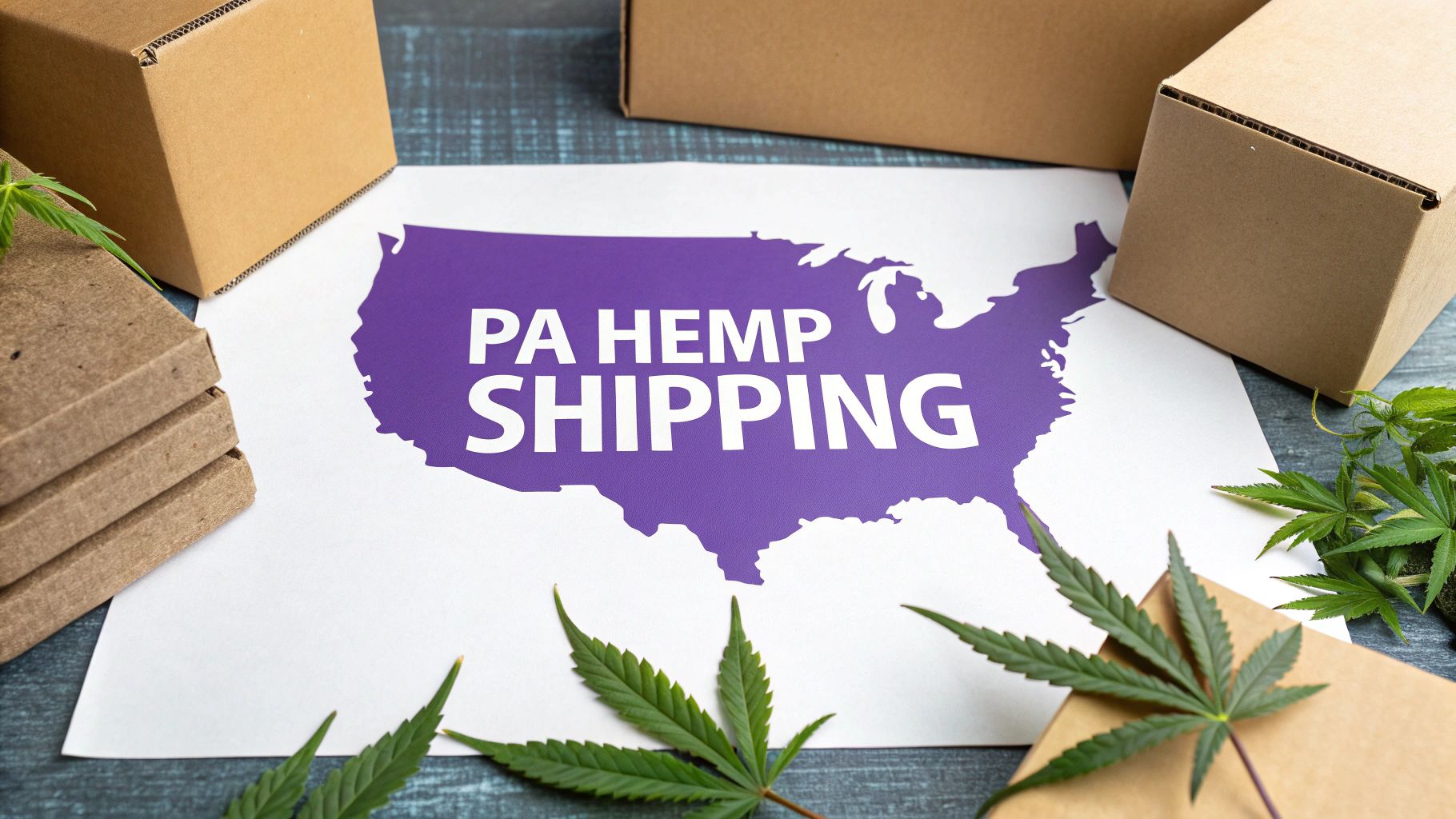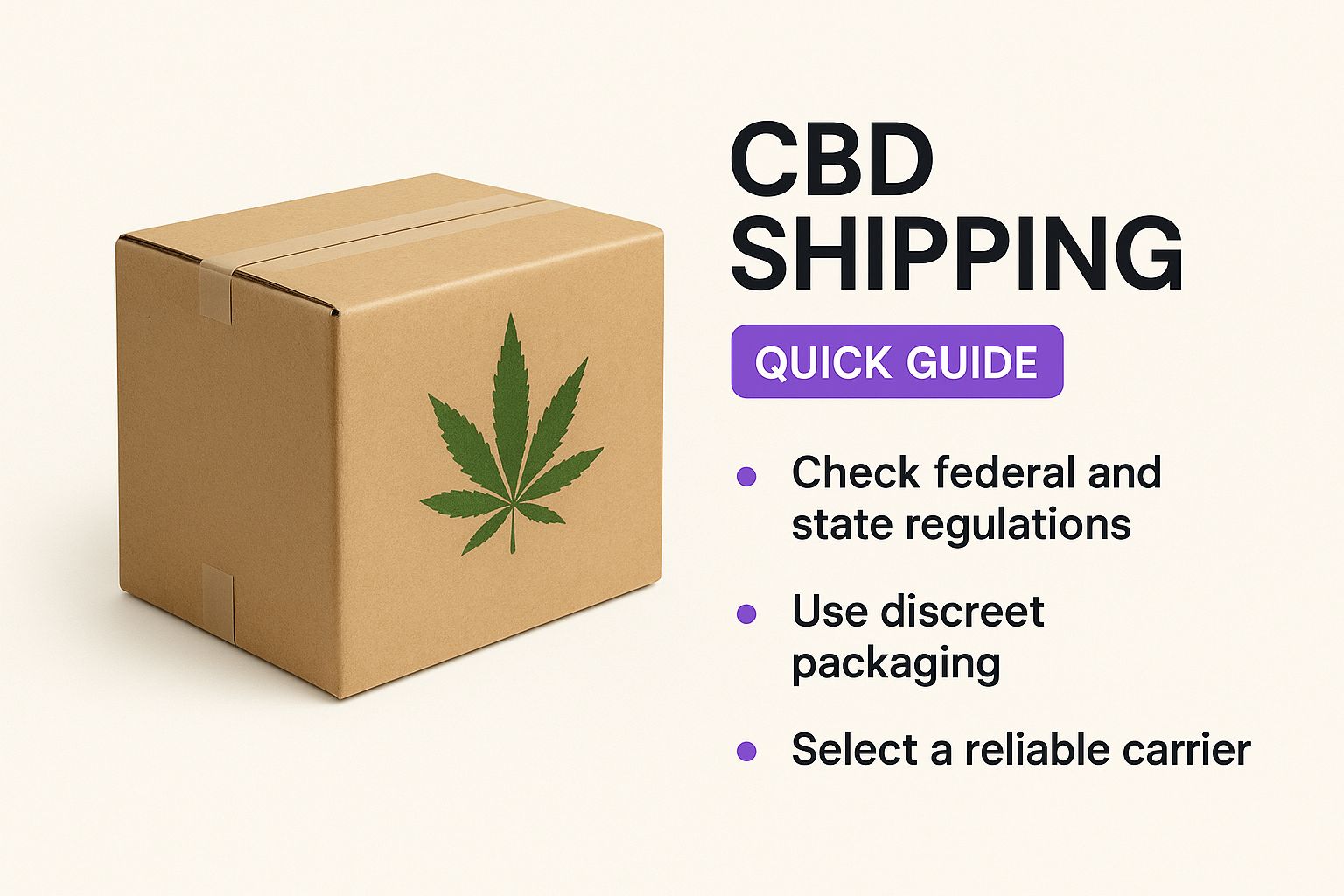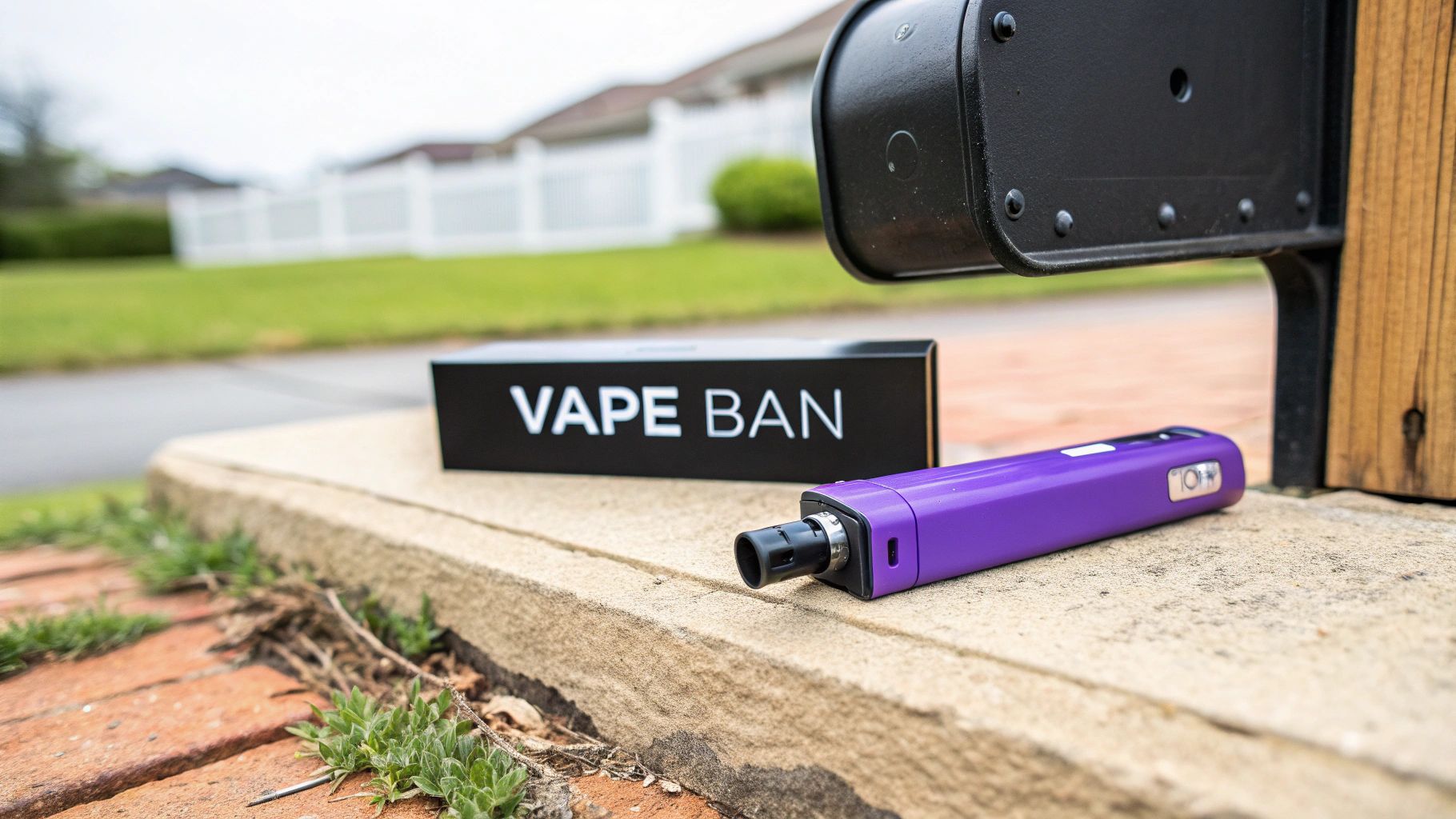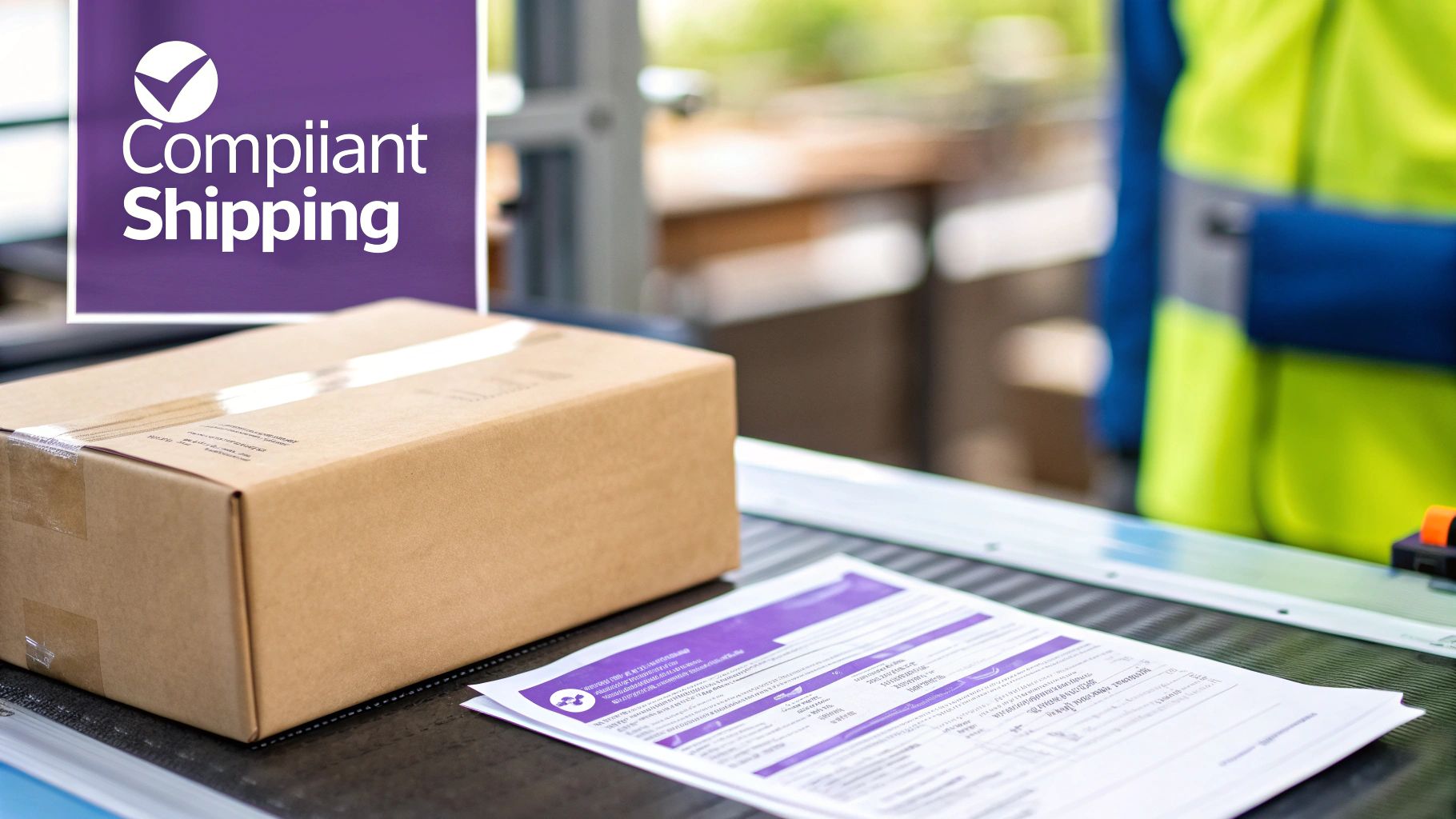
CBD/Hemp/THCA Shipping Laws Pennsylvania: What You Need to Know
Learn essential details about CBD/Hemp/THCA Shipping Laws Pennsylvania. Ensure legal compliance and safe shipping practices in PA. Read our guide now!
Cody Y.
Updated on Oct 12, 2025
In Pennsylvania, shipping most hemp-derived products like CBD oils and edibles is generally legal—as long as they stay under the 0.3% Delta-9 THC limit. But there's a huge catch: a federal law called the PACT Act creates a near-total ban on mailing vape products directly to consumers. This one rule grounds a massive segment of the market, and knowing the difference is critical.
This guide will break down these crucial distinctions for you.
A High-Level View of Pennsylvania Hemp Shipping
Trying to figure out CBD, hemp, and THCA shipping in Pennsylvania can feel like solving a puzzle with pieces from different boxes. On one side, you have the federal 2018 Farm Bill, which gave hemp the green light nationwide. On the other, you've got state-specific rules and strict federal carrier policies that make the whole picture pretty complex.
The infographic below gives you a quick visual guide to the shipping landscape.

As you can see, while many products are cleared for takeoff, others—specifically vapes—are stuck on the tarmac because of those tough federal rules. The main takeaway here is that legality isn't a simple "yes" or "no." It all comes down to the product type and how you're trying to ship it.
To ship successfully in and out of Pennsylvania, every business needs to get these core principles down cold:
- The 0.3% Delta-9 THC Rule: This is the bedrock of hemp legality, straight from the 2018 Farm Bill. If a product goes over this line, it’s legally considered marijuana—a controlled substance—and you absolutely cannot ship it.
- PACT Act Restrictions: This is the big one for vapes. The federal government treats all vape products as "Electronic Nicotine Delivery Systems" (ENDS), whether they contain nicotine, CBD, or THCA. This blanket classification effectively bans them from being mailed to consumers through USPS and triggers similar bans from private carriers like FedEx and UPS.
- State vs. Federal Alignment: For the most part, Pennsylvania law lines up with the federal Farm Bill. This means most non-inhalable hemp products are good to go, and the state doesn't throw up extra roadblocks for things like tinctures, gummies, or topicals.
Understanding these distinctions is the first step to staying compliant. The difference between a smooth delivery and a seized package often boils down to knowing exactly which rules apply to which products. For instance, shipping a bottle of CBD oil is pretty straightforward. But sending a THCA vape cartridge? That's a whole different ballgame, requiring you to navigate a completely separate and much stricter set of regulations.
The rest of this guide will dive deeper into these details.
To make things even clearer, here’s a quick summary of how different hemp products are treated for shipping purposes in Pennsylvania.
Shipping Status of Hemp Products in Pennsylvania
This table gives you a snapshot of what’s generally allowed and what to watch out for.
| Product Type | Federal Legality (Delta-9 THC < 0.3%) | Shipping Status in PA | Key Regulations |
|---|---|---|---|
| CBD Oils/Tinctures | Legal | Permitted | Must be < 0.3% Delta-9 THC. Labeling should be accurate. |
| CBD Edibles | Legal | Permitted | Subject to Food Safety Modernization Act (FSMA) rules. |
| Hemp Flower | Legal | Permitted | Must be shipped in odor-proof, discreet packaging with COAs. |
| THCA Flower | Legal | Permitted | Same rules as hemp flower; total THC considerations apply. |
| CBD/Hemp Vapes | Legal (Product Itself) | Banned from Mail | PACT Act prohibits shipping directly to consumers via USPS/carriers. |
| THCA Vapes | Legal (Product Itself) | Banned from Mail | Same PACT Act restrictions apply; cannot be mailed to consumers. |
This table shows that while most hemp products are perfectly legal to possess and sell, the method of delivery is what creates the biggest compliance headaches, especially for anything vape-related.
Decoding the Legal Landscape of Hemp CBD and THCA
<iframe width="100%" style="aspect-ratio: 16 / 9;" src="https://www.youtube.com/embed/3EL9xqbK_II" frameborder="0" allow="autoplay; encrypted-media" allowfullscreen></iframe>Before you can even think about navigating CBD, Hemp, and THCA shipping laws in Pennsylvania, you've got to get a handle on the products themselves. The entire legal house of cards is built on one simple, yet critical, idea from the 2018 Farm Bill: the line between hemp and marijuana.
Think of it this way: a sweet bell pepper and a fiery habanero both come from the same plant family. They look similar, but one chemical—capsaicin—is the difference between a mild vegetable and something that will light you up. Hemp and marijuana are the same way. Both come from the cannabis plant, but their legal fate hangs on the concentration of a single cannabinoid: delta-9 THC.
This federal law drew a clear line in the sand. Any cannabis plant, or product made from it, with less than 0.3% delta-9 THC by dry weight is legally considered hemp. Step over that line, even by a hair, and it becomes marijuana—a federally controlled substance.
The Foundation of Hemp Legality
That 0.3% rule is the bedrock of the entire hemp industry. It's the reason products packed with other cannabinoids like CBD (Cannabidiol) and THCA (Tetrahydrocannabinolic acid) can be legally grown, sold, and shipped across the country, including into Pennsylvania.
So long as that CBD oil, THCA flower, or hemp-derived edible stays under the legal THC limit, it’s not a controlled substance. This is the single most important concept to grasp when figuring out the differences in hemp vs marijuana shipping laws and why one package gets delivered while another could get seized.
Pennsylvania’s approach to hemp-derived cannabinoids like CBD, delta-8, and delta-10 THC is often marked by legal ambiguity. Under the 2018 Farm Bill, hemp-derived products containing less than 0.3% delta-9 THC by dry weight remain technically legal. You can explore more insights into Pennsylvania's evolving cannabinoid regulations and what the future may hold.
Why This Distinction Matters for Shipping
When it comes to logistics, this legal separation is everything. Shipping a product classified as hemp is a completely different ballgame than shipping a controlled substance. Compliant hemp products can move freely through USPS and private carriers like UPS and FedEx, as long as they follow specific packaging and documentation rules.
But here’s where it gets tricky. Pennsylvania’s rules for hemp products mostly mirror federal law, but the state can add its own layers of complexity. Take THCA, for example. In its raw form, it’s legal because its delta-9 THC content is low. The catch? When you heat it (like by smoking it), it converts directly into THC. This "potential for conversion" creates a legal gray area that shippers have to navigate with extreme care.
Everything that follows in this guide stems from this core distinction: hemp is a legal agricultural good, while marijuana is a controlled substance. If you don't get this part right, the rest of the shipping regulations won't make sense. It’s what determines what can be sold, who can sell it, and how it can legally land on a customer's doorstep in the Keystone State.
Pennsylvania's Rules for Hemp Growers and Processors
To really get a handle on CBD/Hemp/THCA shipping laws in Pennsylvania, you have to start at the source—the fields and facilities where it all begins. The state’s entire legal hemp framework is built on a foundation of strict rules for growers and processors. Think of it as a quality control system that kicks in long before a package ever hits a mailbox.
The main player here is the Pennsylvania Department of Agriculture (PDA), which runs the show for the state's hemp program. Anyone looking to grow or process hemp needs a permit, and getting one is no simple rubber stamp. Applicants go through a serious vetting process, which includes mandatory criminal background checks, to make sure they're up to snuff. This first step helps keep the industry accountable from day one.
The Critical Role of THC Testing
Once a permit is in hand, the real compliance work starts. Pennsylvania has strict testing protocols to ensure hemp crops never creep over the 0.3% delta-9 THC threshold. This isn't just a one-and-done check; growers must get their crops tested by an approved lab within a tight window right before harvest.
If a crop tests "hot"—meaning it’s over the legal THC limit—it can't be sold or processed. Period. Instead, it has to be destroyed under the PDA's supervision. This rule is probably the most important checkpoint in the entire supply chain, as it stops non-compliant cannabis from being passed off as legal hemp. It guarantees that the raw materials for CBD oils, edibles, and THCA flower are legal from the moment they leave the farm.
Pennsylvania's Prohibited Varieties List
Pennsylvania takes its compliance game a step further by actively managing which types of hemp can even be planted. The state keeps a "Prohibited Varieties" list, which is a key tool for managing risk. This list bans any hemp strain that has a known history of testing above the 0.3% THC limit in past growing seasons.
By banning these genetically prone varieties, the PDA proactively cuts down the chances of a non-compliant crop ever taking root. It’s a forward-thinking approach designed to protect farmers from a total loss and safeguard the integrity of the state’s hemp market.
The Pennsylvania Department of Agriculture’s 2025 Hemp General Permit keeps this tight oversight in place, enforcing detailed THC testing and maintaining its list of prohibited hemp varieties. This list includes any strain that tested "hot" at least once between 2017 and 2024. You can learn more about which hemp varieties are prohibited and why by checking out the official state documents.
Understanding these upstream rules gives you crucial context for shipping. It clarifies why Pennsylvania-sourced products are grown under such a watchful eye, all with the goal of building a compliant and trustworthy supply chain from the ground up.
Shipping Restrictions: The PACT Act's Big Impact on Vape Products

While most hemp products can cruise through Pennsylvania's shipping lanes without much trouble, there's one category that slams right into a federal brick wall: vape products. This isn't a Pennsylvania rule; it's the result of a sweeping federal law called the Prevent All Cigarette Trafficking (PACT) Act.
The PACT Act was originally aimed at stopping illegal online tobacco sales, but an update expanded its reach dramatically. Now, it covers all Electronic Nicotine Delivery Systems (ENDS)—a term that unfortunately acts as a giant catch-all for any vaping device, component, or liquid.
And that's where the problem starts for the hemp industry. The law makes no distinction between a vape cartridge filled with nicotine, CBD, or THCA. It treats them all exactly the same. By lumping every vape under the ENDS umbrella, the PACT Act has effectively shut down most direct-to-consumer shipping for these products.
The USPS Ban on All Vapes
The most immediate fallout from the PACT Act's expansion is a near-total ban on shipping any vape products through the U.S. Postal Service (USPS). This isn't a gray area. After the act was updated, the USPS published its final rule in October 2021, making it crystal clear: mailing ENDS directly to consumers is prohibited.
This means you can't just toss a package with a THCA vape pen into a mailbox and send it on its way. This is a federal mandate, and breaking it comes with serious consequences, including steep fines and even potential criminal charges.
Key Takeaway: The PACT Act is product-neutral. A nicotine-free CBD vape is regulated for shipping just like a traditional e-cigarette. This creates a massive logistical headache for any hemp business selling inhalable products.
Private Carriers Follow Suit
So, can you just use a private carrier to get around the USPS ban? Unfortunately, that door is also firmly closed. Major players like FedEx and UPS quickly aligned their policies with the spirit of the PACT Act, creating their own strict rules against shipping vape products to consumers.
- FedEx: Flat-out prohibits shipping all e-cigarettes and vaping devices, liquids, and accessories within its U.S. network.
- UPS: Has a similar ban on shipping any vaping products—from devices to e-liquids—to, from, or within the United States.
These policies create a united front, leaving businesses with almost no viable options for shipping vapes directly to a customer's home in Pennsylvania. For any online retailer, understanding PACT Act compliance for online stores isn't just a good idea—it's absolutely essential for staying in business. Trying to find loopholes or mislabeling packages is a high-risk gamble that could easily put your entire operation in jeopardy.
Best Practices for Shipping Complaint Hemp Products

Once you've got the rules down, successful shipping is all about execution. Think of it like a pilot's pre-flight checklist. You need to meticulously go through every single step to make sure your package gets from your warehouse to your customer's door without a hitch. Getting this right from the start is your best defense against seizures, delays, or legal headaches.
The goal is to create a package that’s both discreet and completely transparent. It shouldn't scream "cannabis," but if an official ever opens it, its legality should be immediately obvious.
This starts with the outside of the box. Use plain, generic packaging—no cannabis leaf logos, no flashy branding, nothing that hints at what's inside. The box also has to be 100% smell-proof. This is non-negotiable, especially for hemp flower, since its aroma is identical to marijuana and is an instant red flag. Using vacuum-sealed bags or other odor-proof containers inside your main shipping box is standard procedure and a must-do.
Your Shipment's Legal Passport: Essential Documents
Think of your paperwork as your shipment's passport. It’s the immediate, verifiable proof that what's inside is a legal hemp product, fully compliant with the 2018 Farm Bill. Never, ever ship a package without this critical documentation inside.
Here’s what every single box needs to contain:
- A Third-Party Certificate of Analysis (COA): This is the single most important document. It's a lab report that breaks down the product's cannabinoid profile, proving its delta-9 THC concentration is at or below the legal 0.3% limit.
- A Notice to Law Enforcement: This is a simple, printed letter that clearly states the package contains federally legal industrial hemp. It should reference the 2018 Farm Bill and cite the relevant legal codes, giving any inspecting officer the context they need right away.
When you include these documents, you’re answering questions before they’re even asked. This one simple step can be the difference between a smooth delivery and a confiscated shipment. It shows you’re serious about compliance with CBD/Hemp/THCA shipping laws in Pennsylvania.
A well-documented, professionally packed shipment is your best insurance policy for navigating the complex web of state and federal rules. If you want to dive deeper into the nationwide landscape, check out our comprehensive guide on general hemp shipping rules and restrictions.
Compliant Shipping Checklist
To help you stay on track, we've put together a simple checklist. Run through these steps for every shipment to ensure you're ticking all the right boxes for a compliant and hassle-free delivery.
| Checklist Item | Purpose | Status (Yes/No) |
|---|---|---|
| THC Content Verified (<0.3%) | Confirms product is legal industrial hemp. | |
| Certificate of Analysis (COA) Included | Provides third-party lab proof of legality. | |
| Notice to Law Enforcement Included | Informs officials about the package contents and legality. | |
| Plain, Unmarked Outer Packaging | Ensures discretion and avoids unwanted attention. | |
| Smell-Proof Inner Packaging | Prevents odors that could be mistaken for marijuana. | |
| Securely Sealed and Padded | Protects the product from damage during transit. | |
| Carrier Policy Verified | Confirms compliance with the specific rules of USPS, UPS, or FedEx. |
By making this checklist a routine part of your fulfillment process, you build a solid foundation of compliance that protects your business, reassures your customers, and keeps your products moving smoothly.
Navigating the Gray Area of THCA Shipping
THCA products live in a tricky, often misunderstood legal space, and anyone shipping them needs to pay close attention. On paper, the logic seems simple enough. Thanks to the 2018 Farm Bill, THCA flower is technically legal hemp as long as its delta-9 THC content stays below the 0.3% line in its raw, unheated form.
This is the key distinction that allows THCA to be sold and shipped in the first place. You can think of THCA as the non-psychoactive precursor to THC. It only converts into the compound that produces a "high" when you apply heat—a process called decarboxylation—like when you smoke or vape it. So, sitting in its package, it perfectly fits the federal definition of legal hemp.
The Real-World Shipping Challenge
Here’s where theory crashes into reality. This technical legality creates a massive real-world problem: raw THCA flower looks, smells, and feels exactly like illegal marijuana. To a law enforcement officer or a mail carrier, there's absolutely no way to tell the difference between a compliant hemp shipment and a federally controlled substance just by looking at it.
This creates a serious risk while your package is in transit. A box that smells strongly of cannabis is practically begging to be flagged, seized, and sent for testing. And while the Certificate of Analysis (COA) you included can eventually prove your shipment is legal, that process can lead to huge delays, lost products, and a ton of legal stress.
The core issue isn't the letter of the law but how it's applied on the ground. A product can be 100% legal and still get confiscated because it’s visually identical to an illegal one. This makes rock-solid documentation and discreet packaging non-negotiable.
If you’re going to operate in the high-risk, high-reward THCA market, you have to make risk mitigation your top priority. That means going far beyond standard shipping practices.
- Vacuum-Sealed Packaging: Don't just seal it once. Use multiple layers of professional, smell-proof packaging to lock in every bit of aroma.
- Prominent Documentation: Place your COA and a clear "Notice to Law Enforcement" right on top, so it’s the first thing anyone sees when they open the box.
- Discreet Outer Boxing: Use plain, unmarked boxes. No logos, no clever branding—nothing that even hints at what might be inside.
Taking these extra steps shows you understand the nuances of CBD/Hemp/THCA shipping laws in Pennsylvania and are doing everything possible to build the strongest case for your shipment's compliance.
Frequently Asked Questions
Even when you feel like you've got a handle on the rules, specific situations always come up. Let's tackle some of the most common questions we hear about shipping CBD, Hemp, and THCA products in Pennsylvania to clear up any lingering confusion.
Can I Legally Receive THCA Flower By Mail in Pennsylvania?
Yes, you can. As long as the THCA flower clocks in at less than 0.3% delta-9 THC by dry weight, it's legally classified as hemp under the 2018 Farm Bill. That means it's perfectly legal to ship.
The key is making sure the vendor you buy from is on top of their game. They absolutely must include a Certificate of Analysis (COA) in the box to prove its legality. Be aware that to the naked eye, THCA flower looks and smells just like illegal marijuana, so having that documentation on hand is non-negotiable to avoid a major headache.
What Happens If My Legal CBD Shipment Is Seized?
It's a frustrating scenario, but if a legally compliant shipment gets seized, don't panic. The first move is to contact both the shipping carrier and the law enforcement agency that took it.
You'll need to provide them with copies of the product's lab reports (the COA) and your business's hemp license. This is where being organized pays off.
A smart, proactive step is to include a 'Notice to Law Enforcement' right inside the package. This simple document can often stop a seizure before it even happens by immediately explaining what's inside and why it's legal.
Are There Any Special Shipping Rules For CBD Edibles?
Pennsylvania doesn't have specific shipping laws that target CBD edibles. They fall under the same broad rule as everything else: they must be derived from legal hemp containing less than 0.3% delta-9 THC.
However, edibles are still food products. That means you also have to comply with all the standard food safety and labeling regulations from both the FDA and the Pennsylvania Department of Agriculture. Make sure your packaging is secure, professional, and clearly labeled with all ingredients and cannabinoid content.
Can I Use UPS or FedEx to Ship CBD Products in Pennsylvania?
You bet. Both UPS and FedEx allow shipments of hemp and CBD products, provided they follow all federal and state laws.
That said, they have their own specific corporate policies and can reject any shipment they're not comfortable with. It's crucial to know that shipping any vape products through these carriers is strictly prohibited. The best practice is to check their most current hemp shipping policies directly and consider setting up a specific shipping agreement with them for your business.
Trying to keep all these shipping rules straight is a full-time job. Ship Restrict automates your compliance, letting you set up granular shipping restrictions by state, county, city, or ZIP code. You'll never have to worry about making a costly mistake again. Discover how Ship Restrict can protect your business.

Cody Yurk
Founder and Lead Developer of ShipRestrict, helping e-commerce businesses navigate complex shipping regulations for regulated products. Ecommerce store owner turned developer.